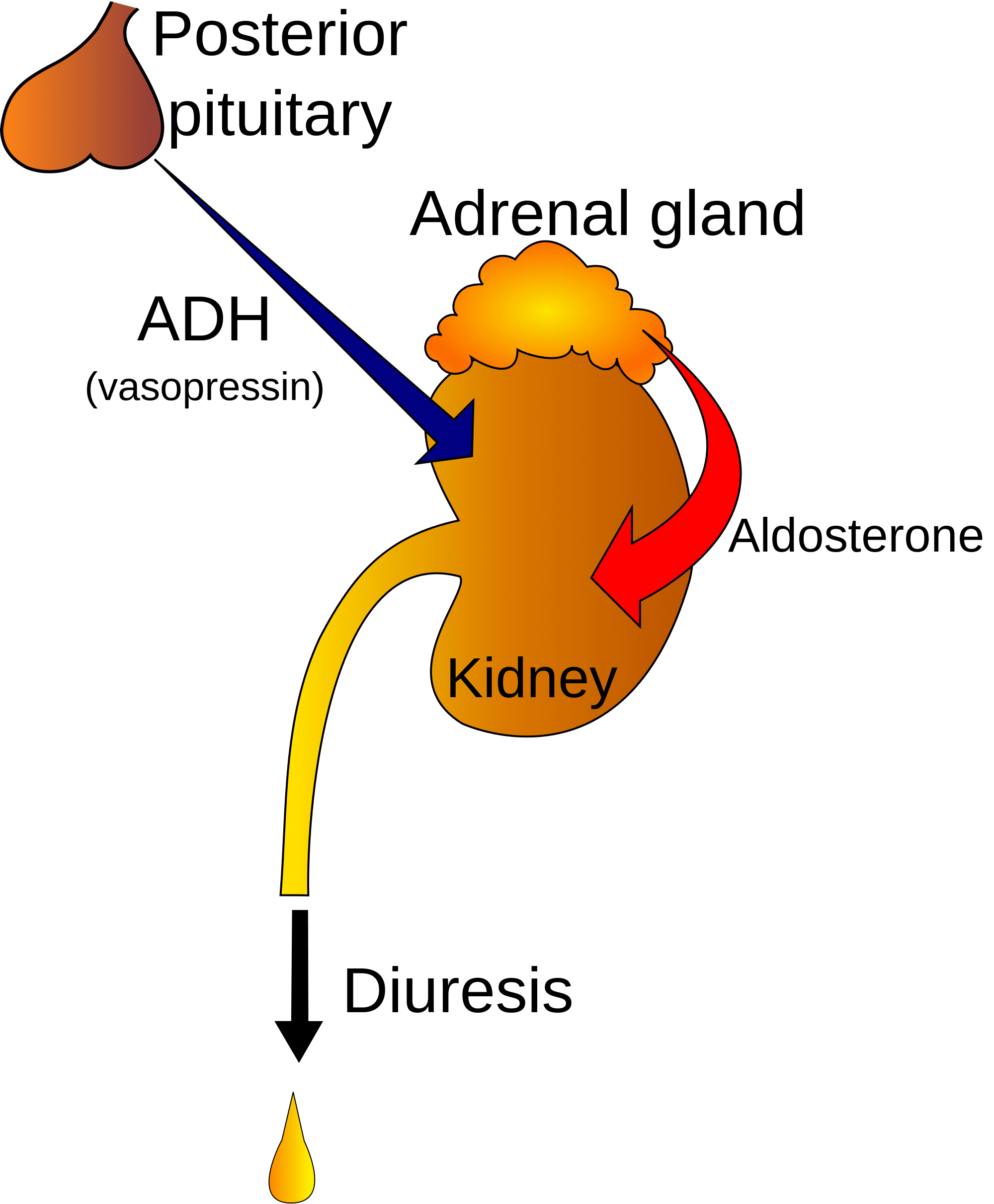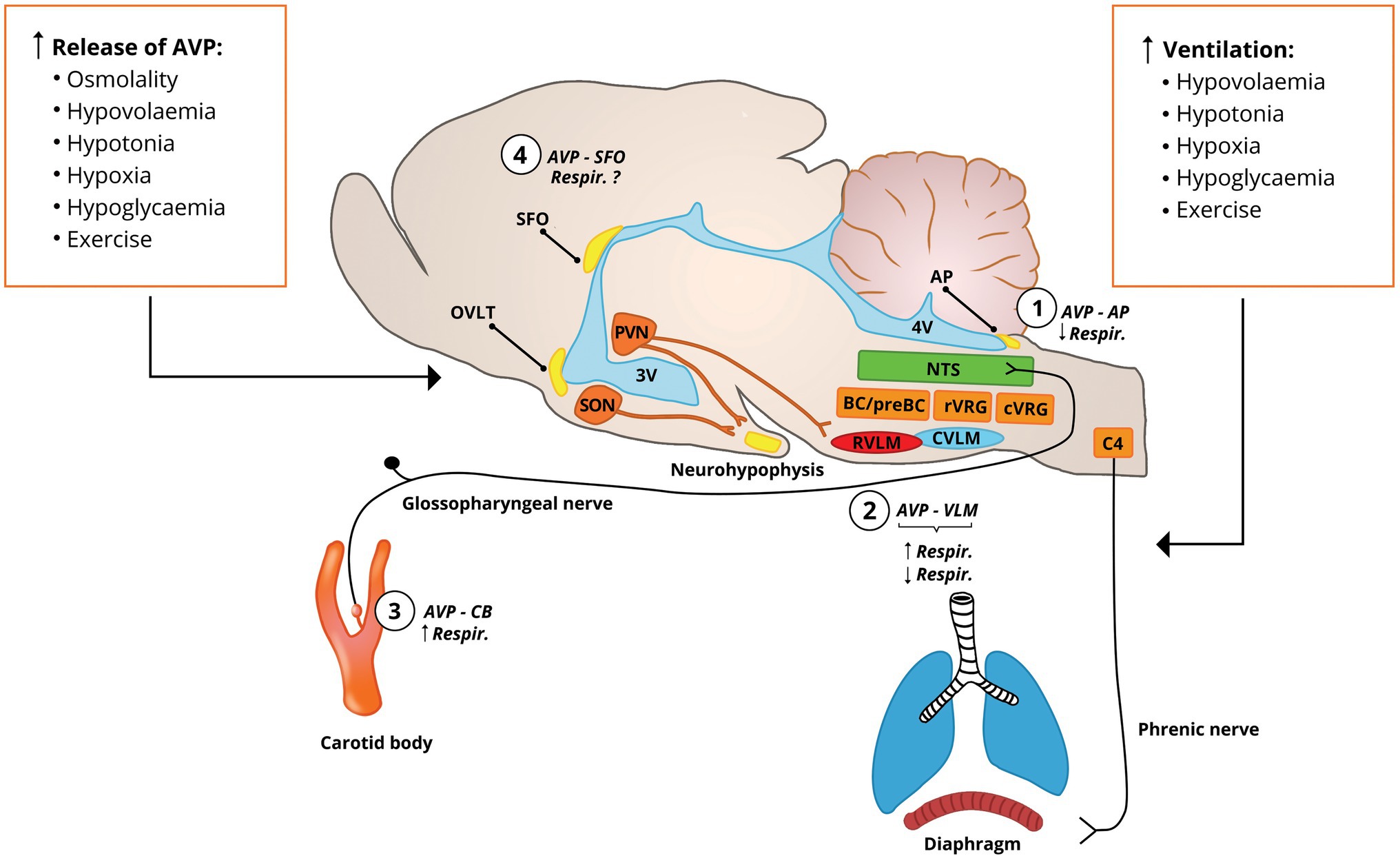In response to ADH the collecting duct and distal tubule in the kidney become more permeable to water which increases water reabsorption into the capillaries. Calcitriol - is responsible for the rise of calcium in the blood.

Antidiuretic Hormone Adh Synthesis Release Teachmephysiology
The mechanism by which antidiuretic hormone exerts its effect on pancreatic secretory flow and electrolyte composition is.

. ADH is released from the hypothalamus in response to high tissue osmolarity. ADH exerts its effects on the distal convoluted tubule and. This increases intravascular fluid volume and decreases the amount of urine voided out of the body.
Anti-diuretic hormone is also released by thirst nausea vomiting and pain and acts to keep up the volume of fluid in the bloodstream at times of stress or injury. The system exerts its influence via release or inhibition of vasopressin antidiuretic hormone ADH which acts on the kidney to decrease water excretion. A follicle - stimulating hormone B adrenocorticotropic hormone C prolactin D thyroid - stimulating.
ADH increases the reabsorption of water from the urine in the renal system back into the blood. Antidiuretic hormone or ADH is a small protein that increases water absorption and blood pressure. ADH exerts its antidiuretic effect in the CD via the V 2 receptor on the basolateral membrane of the principal and inner medullary CD cells.
Check all that apply Check All That Apply ADH decreases the water permeability of the collecting duct. Other factors that promote the release of ADH include exercise angiotensin II and emotional states such as pain. Inhibit the rate at which calcium enter body fluids.
Antidiuretic hormone or ADH is a small protein that increases water absorption and blood pressure. Explore how ADH affects water reabsorption sodium and blood pressure in this lesson. In response to ADH the collecting duct and distal tubule in the kidney become more permeable to water which increases water reabsorption into the capillaries.
In addition it promotes smooth muscle contraction in the kidneys and cardiovascular system which occurs by the mediation of V1 receptors. Due to its urine-concentrating effect in the kidneys it is often referred to as antidiuretic hormone. 71 72 Binding of ADH to the V 2 receptor results in activation of adenylcyclase increased cAMP and activation of protein kinase A.
Antidiuretic hormone ADH Diff. ANP Atrial Natriuretic Peptide - is responsible for the promotion of sodium and water excretion as well as blood pressure regulation. Antidiuretic hormone ADH is important in maintaining homeostasis in mammals.
It increases cyclic adenosine monophosphate increasing water permeability of the kidney tubules which is mediated through V2 receptors. Deficiency of ADH is usually due to hypothalamic-neurohypophyseal lesions central diabetes insipidus or insensitivity of the kidney to ADH. Increase the rate at which proteins are synthesized.
Anatomy and Physiology questions and answers. The ADH test measures how much ADH is in your blood. It exerts its effects by acting on V1 and V2 receptors.
ADH binds to the V receptor on these cells and leads to the activation of adenylate cyclase which causes a subsequent increase in the second messenger cyclic AMP cAMP. Subsequent phosphorylation of the cytoplasmic COOH terminus at serine 256 of the aquaporin-2 AQ2. 319 17 Which one of the following hormones exerts its primary effects on the reproductive organs.
Alcohol prevents anti-diuretic hormone release which causes an increase in urine production and dehydration. ADH principally exerts its effects by binding to the kidneys principal cells within the late distal tubule and collecting ducts. Up to 10 cash back Calcium magnesium and total protein concentrations increased significantly following administration of antidiuretic hormone.
Which of the following is an effect of antidiuretic hormone ADH on water retention in the collecting duct. CAMP activates protein kinase A PKA a phosphorylating. Reduce the rate at which carbohydrates are utilized.
ADH exerts its effects on the distal convoluted tubule and collecting duct of the nephron by upregulating aquaporin-2 channels AQP2 on the cellular apical membrane surface. Antidiuretic hormone ADH is a hormone that helps your kidneys manage the amount of water in your body. Explore how ADH affects water reabsorption sodium and blood pressure in.
ADH is released from the hypothalamus in response to high tissue osmolarity. It also is an important mechanism in maintaining normal body fluid volume. Which of the following hormones exerts its effect primarily on the reproductive organs.
Besides its antidiuretic renal effects AVP is a potent neurohormone involved in the regulation of arterial blood pressure sympathetic activity baroreflex sensitivity glucose homeostasis release of glucocorticoids and catecholamines stress response anxiety. Diabetes insipidus DI is an endocrine condition involving the posterior pituitary peptide hormone antidiuretic hormone ADH. Antidiuretic hormone ADH is important in maintaining homeostasis in mammals.
Inhibit activities within the nervous system. ADH stimulates aquaporin synthesis ADH release is stimulated by an increase in blood osmotic pressure. They are found in the atria of the heart but exerts its effects in the kidney.
The secretion of pituitary hormones is largely controlled by the hypothalamus TF. Diabetes insipidus DI is an endocrine condition involving the posterior pituitary peptide hormone antidiuretic hormone ADH. ADH release is inhibited by atrial natriuretic peptide ANP which is released by stretched atria in response to increases in blood pressure as well as alcohol and certain medications.

Frontiers Vasopressin And Breathing Review Of Evidence For Respiratory Effects Of The Antidiuretic Hormone Physiology
18 3 Regulation Of Body Processes Concepts Of Biology 1st Canadian Edition

0 Comments